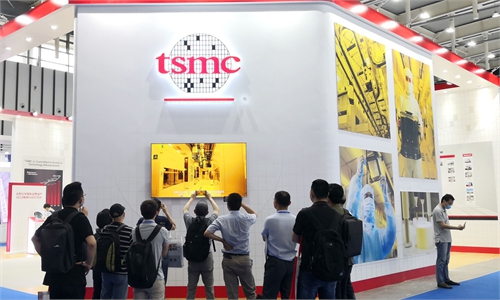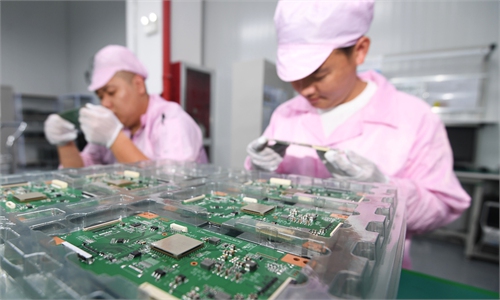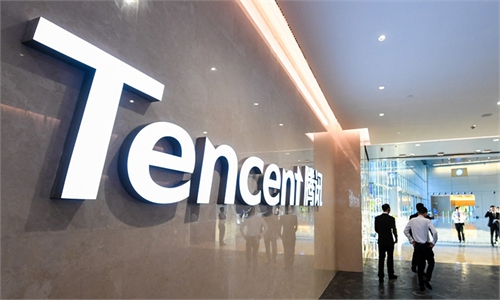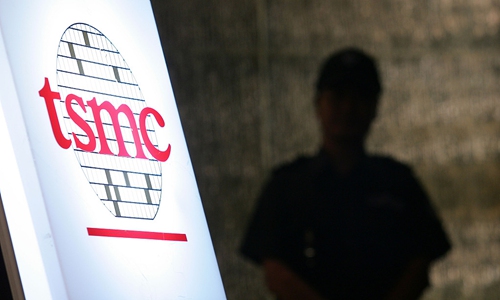
TSMC
Some of the world's largest chipmakers including Taiwan Semiconductor Manufacturing Company (TSMC) have responded to a contentious US government request to submit chip data ahead of the Monday deadline, in a move described by industry observers as yet another instance of US hegemony that coerces global semiconductor supply chains to bow to arbitrary requirements way beyond commercial standards.
The information request, seen as a possible maneuver to target China, a thorn in the flesh for US desire for chip leadership, could create more problems than it solves, analysts said, noting that the affected businesses can resort to legal action in case of damage caused.
As of press time Monday, 23 entities, including TSMC, Micron Technology, Western Digital, United Microelectronics Corporation, and Shinko Electric Industries, had submitted supply chain-related information, according to a list of submissions filed with regulations.gov.
The TSMC response, dated November 5, was an anonymous comment with confidential business information, according to the website.
The Taiwan-based chip giant said Monday that no detailed information on customers was disclosed, Reuters reported.
TSMC did not respond to the Global Times request for comment as of press time.
South Korean tech firms are preparing for a "voluntary submission," Bloomberg reported on Sunday, citing a South Korean finance ministry statement.
Samsung and SK Hynix remain missing from the list of submitters by press time.
Political trickery
The request, unveiled by the US Commerce Department in late September, smacks of an attempt to contain China's tech rise under the disguise of addressing chip shortages, according to industry insiders.
It remains obscure as to what might be next on the US government agenda after the collection of chip supply chain information, but it seems almost for sure that such a request aims at cornering Chinese tech firms, a semiconductor industry insider told the Global Times on Sunday on condition of anonymity.
TSMC and other possible submitters such as Samsung have partnerships with Chinese firms including Huawei. What the US requests to submit largely falls under commercial secrets and products parameters of some Chinese mainland firms are among them, the insider said, arguing against the unreasonable request.
Elucidating its information request as an effort to identify "data gaps and bottlenecks in the supply chain, and potential inconsistent demand signals," the US Commerce Department enumerated a flurry of questions in its September notice for wide-ranging parties including domestic and foreign chip design firms, materials and equipment suppliers and end-users that intrude into client information.
For instance, among the information and data it's seeking from semiconductor product designers, manufacturers and microelectronics assemblers, and their suppliers is "for any integrated circuits you produce - whether fabricated at your own facilities or elsewhere - identify the primary integrated circuit type, product type, relevant technology nodes (in nanometers), and actuals or estimates of annual sales for the years 2019, 2020, and 2021 based on anticipated end use."
These are relatively important business secrets, given that information such as orders and prices are very important in an industry, and a lot of company information can also be revealed from it, including the company's product plans, maturity, and expected prices, a chip industry expert surnamed Zhao with Southeast University told the Global Times on Monday.
The information request came after a White House report in June that included a 100-day supply chain review of semiconductors and advanced packaging, as mandated by a presidential executive order in February. The report, with multiple mentions of China, identified dependence on China for sales revenue as one of the key risks pertaining to chip fabrication.
It's actually a routine practice that for each order, customers are required to fill in basic product information in accordance with US Commerce Department requirements. But that is nowhere comparable to the specifics as listed in the September notice, a Chinese firm acting as an authorized agent for a major global semiconductor manufacturer focused on the auto sector revealed to the Global Times on Monday.
Problem creator, not solver
The politically motivated request could by no means address chip shortage woes and is likely to hit legal snags and be met with legal action from Chinese firms in the event of losses, analysts said.
TSMC, among chipmakers with manufacturing capacities in the US, had been grappling with the supply chain disclosure, despite their eventual compromise, according to the industry insider.
The US request does no good for either China or the US, as well as the global semiconductor industry, the insider added, stressing that a possible US attempt to shift chip factories to the US would mean much higher logistics costs.
China, home to diversified semiconductor supply chains, purchases $300 billion of chips from the US and elsewhere, industry data showed, with a considerable part of them processed and manufactured in China before exporting to other countries and regions.
Based on the takeaways from the insider's previous communication with US equipment makers, the US semiconductor business community is actually sparing no effort to lobby the US government to strengthen cooperation with China, rather than the other way around, the industry veteran told the Global Times, disclosing that China accounts for at least 20 percent of US semiconductor manufacturers' global market sales.
"The US government is politically motivated, rather than playing by commercial logic."
Zhao noted that the US targets not only Chinese companies, but global companies, so the impact is great.
There should be no precedent for such data disclosure, and its legality is questionable, said Zhao.
If the US Department of Commerce requires chipmakers to provide user information, resulting in losses to related companies, then companies should unite and pursue legal action to safeguard their own interests, Zhao said.
In a successful instance of legal action taken by a Chinese firm against the US government, Chinese smartphone vendor Xiaomi in May reached an agreement with the US Department of Defense, under which the Pentagon will remove Xiaomi from its blacklist.
The agreement came after a US federal judge in March temporarily suspended enforcement of the blacklisting imposed under the Trump administration, after the Chinese tech firm filed a lawsuit against the US government, calling the blacklisting "unconstitutional."
Moreover, Chinese firms could resort to the country's anti-foreign sanctions law and the data security law in case of damage resulting from the data submission request and possible next steps, experts stressed.
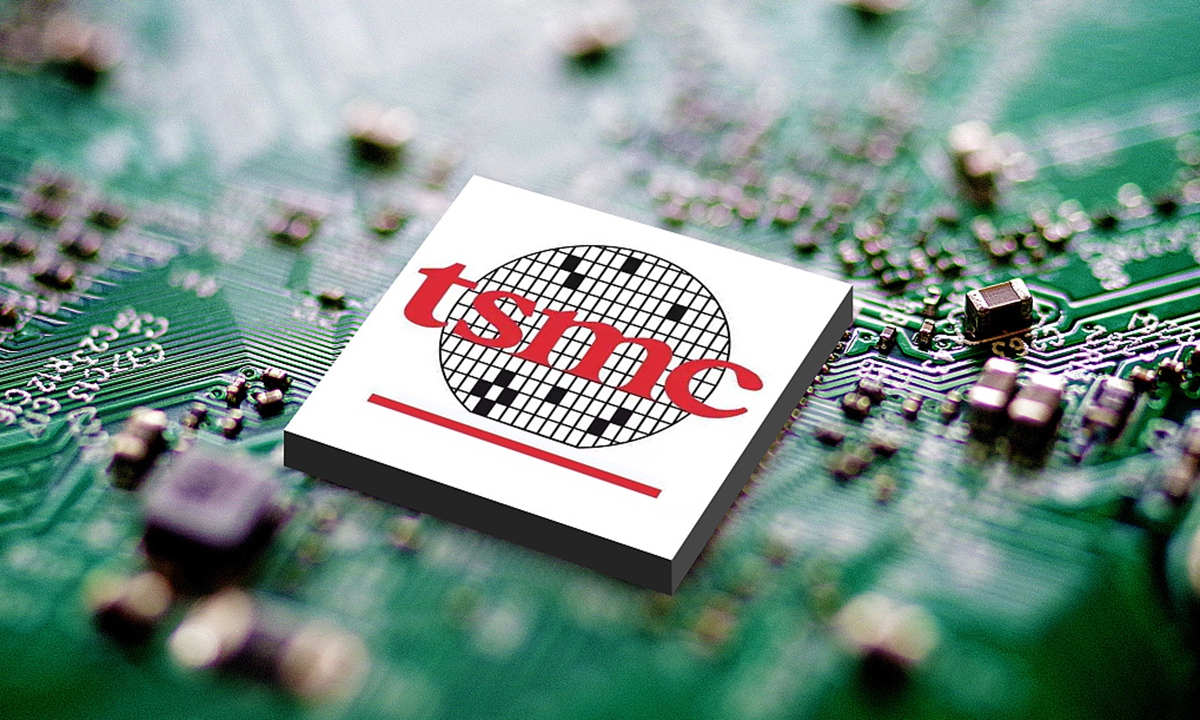
TSMC Photo: VCG
Some of the world's largest chipmakers including Taiwan Semiconductor Manufacturing Company (TSMC) have responded to a contentious US government request to submit chip data ahead of the Monday deadline, in a move described by industry observers as yet another instance of US hegemony that coerces global semiconductor supply chains to bow to arbitrary requirements way beyond commercial standards.
The information request, seen as a possible maneuver to target China, a thorn in the flesh for US desire for chip leadership, could create more problems than it solves, analysts said, noting that the affected businesses can resort to legal action in case of damage caused.
As of press time Monday, 23 entities, including TSMC, Micron Technology, Western Digital, United Microelectronics Corporation, and Shinko Electric Industries, had submitted supply chain-related information, according to a list of submissions filed with regulations.gov.
The TSMC response, dated November 5, was an anonymous comment with confidential business information, according to the website.
The Taiwan-based chip giant said Monday that no detailed information on customers was disclosed, Reuters reported.
TSMC did not respond to the Global Times request for comment as of press time.
South Korean tech firms are preparing for a "voluntary submission," Bloomberg reported on Sunday, citing a South Korean finance ministry statement.
Samsung and SK Hynix remain missing from the list of submitters by press time.
Political trickery
The request, unveiled by the US Commerce Department in late September, smacks of an attempt to contain China's tech rise under the disguise of addressing chip shortages, according to industry insiders.
It remains obscure as to what might be next on the US government agenda after the collection of chip supply chain information, but it seems almost for sure that such a request aims at cornering Chinese tech firms, a semiconductor industry insider told the Global Times on Sunday on condition of anonymity.
TSMC and other possible submitters such as Samsung have partnerships with Chinese firms including Huawei. What the US requests to submit largely falls under commercial secrets and products parameters of some Chinese mainland firms are among them, the insider said, arguing against the unreasonable request.
Elucidating its information request as an effort to identify "data gaps and bottlenecks in the supply chain, and potential inconsistent demand signals," the US Commerce Department enumerated a flurry of questions in its September notice for wide-ranging parties including domestic and foreign chip design firms, materials and equipment suppliers and end-users that intrude into client information.
For instance, among the information and data it's seeking from semiconductor product designers, manufacturers and microelectronics assemblers, and their suppliers is "for any integrated circuits you produce - whether fabricated at your own facilities or elsewhere - identify the primary integrated circuit type, product type, relevant technology nodes (in nanometers), and actuals or estimates of annual sales for the years 2019, 2020, and 2021 based on anticipated end use."
These are relatively important business secrets, given that information such as orders and prices are very important in an industry, and a lot of company information can also be revealed from it, including the company's product plans, maturity, and expected prices, a chip industry expert surnamed Zhao with Southeast University told the Global Times on Monday.
The information request came after a White House report in June that included a 100-day supply chain review of semiconductors and advanced packaging, as mandated by a presidential executive order in February. The report, with multiple mentions of China, identified dependence on China for sales revenue as one of the key risks pertaining to chip fabrication.
It's actually a routine practice that for each order, customers are required to fill in basic product information in accordance with US Commerce Department requirements. But that is nowhere comparable to the specifics as listed in the September notice, a Chinese firm acting as an authorized agent for a major global semiconductor manufacturer focused on the auto sector revealed to the Global Times on Monday.
Problem creator, not solver
The politically motivated request could by no means address chip shortage woes and is likely to hit legal snags and be met with legal action from Chinese firms in the event of losses, analysts said.
TSMC, among chipmakers with manufacturing capacities in the US, had been grappling with the supply chain disclosure, despite their eventual compromise, according to the industry insider.
The US request does no good for either China or the US, as well as the global semiconductor industry, the insider added, stressing that a possible US attempt to shift chip factories to the US would mean much higher logistics costs.
China, home to diversified semiconductor supply chains, purchases $300 billion of chips from the US and elsewhere, industry data showed, with a considerable part of them processed and manufactured in China before exporting to other countries and regions.
Based on the takeaways from the insider's previous communication with US equipment makers, the US semiconductor business community is actually sparing no effort to lobby the US government to strengthen cooperation with China, rather than the other way around, the industry veteran told the Global Times, disclosing that China accounts for at least 20 percent of US semiconductor manufacturers' global market sales.
"The US government is politically motivated, rather than playing by commercial logic."
Zhao noted that the US targets not only Chinese companies, but global companies, so the impact is great.
There should be no precedent for such data disclosure, and its legality is questionable, said Zhao.
If the US Department of Commerce requires chipmakers to provide user information, resulting in losses to related companies, then companies should unite and pursue legal action to safeguard their own interests, Zhao said.
In a successful instance of legal action taken by a Chinese firm against the US government, Chinese smartphone vendor Xiaomi in May reached an agreement with the US Department of Defense, under which the Pentagon will remove Xiaomi from its blacklist.
The agreement came after a US federal judge in March temporarily suspended enforcement of the blacklisting imposed under the Trump administration, after the Chinese tech firm filed a lawsuit against the US government, calling the blacklisting "unconstitutional."
Moreover, Chinese firms could resort to the country's anti-foreign sanctions law and the data security law in case of damage resulting from the data submission request and possible next steps, experts stressed.
